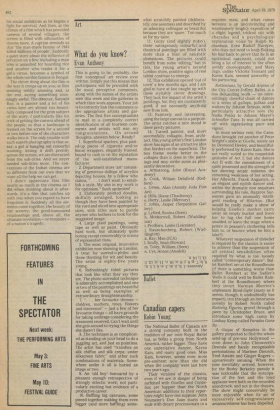Cinema
A nation's tragedy
Kenneth Robinson
Distant Thunder Director: Satyajit Ray Stars: Soumitra Chatterji, Babita 'A' Academy One (105 minutes).
This is the Indian film that won first prize at Berlin's Film Festival in 1973. When 1 heard about it I feared the worst. I remembered the horror of being on that jury myself a few years before. The trouble was that we didn't know each other's languages. And we certainly didn't know each other's cultural backgrounds or traditions. We were especially intimidated by films from India and Japan, and were tempted to make awards to them to hide our ignorance.
So when I knew this Berlin prize-winner was coming to Academy One I didn't feel terribly excited about it. I supposed I'd be seeing the sort of film that means very little if you don't know the country's way of life. Certainly I could have done with a few footnotes. The chief character is a Brahmin who settles down in a Bengal village among families of lower caste. He does this so he can claim the right to be priest, doctor and schoolmaster. This, we gather, is meant to be funny. We can tell by the acting. In fact, Soumitra Chatterji makes the chief character into a cross between Peter Sellers and Monsieur Hulot.
But how funny is it, by Indian standards, that the Brahmin should acquire privileges with so little knowledge? And what about the jokey bit when the man performs a primitive act to rid the village of cholera. After using fire, water, a bell and a sea-shell, he produces the pay-off gag: `And don't forget to avoid stagnant drinking-water'.
Without knowing the current attitudes among smart-city-Indians it's difficult to tell if it's the Brahmin who is meant to look ridiculous here, or the people listening to him. Or is the scene meant to be merely a quizzical look at the slow abandonment of superstitious practices?
That sort of thing bothered me several times. Otherwise the film tells a straightforward story about the effect of war on a peaceful community. The time is 1943. The planes that roar above the sunlit Banyan trees remind the villagers that fighting in Burma is cutting off their supplies of rice. Soon the Brahmin and his beautiful wife (Babita) are having to live like the lower orders. The woman starts husking rice with her neighbours and, like them, preparing meals from weeds and pond-snails. As the couple lose face the husband is brutally thrown aside by men stampeding for food.
The Brahmin loses respect, but he gains dignity. He has always been arrogant and intolerant. Now he is willing to share his house with another starving family. He forgets his social ambitions as he begins a fight for survival. And then, at the climax of a film which has provided cameos of several villagers, the screen is filled with silhouettes of dozens more. A caption reminds us that 'the man-made famine of 1943 killed millions of people'. Suddenly a quiet story about the influence of privation on a few, including a man who is assaulted for hoarding rice and another who trades it for a girl's virtue, becomes a symbol of the whole terrible famine in Bengal.
The clever thing about the film is the way it creeps up on you; at first seeming mildly amusing and, at the end, saying something stunningly awful. The director, Satyajit Ray, is a painter and a lot of his views here are almost too beautifully composed for the grim subject of the story. I particularly like his trick of getting the camera ahead of the people, so that a landscape is framed on the screen for a second or two before one of the characters walks into it. The only trouble with such superb photography is that as, say, a girl is hanging out colourful washing, letting it drift prettily across the screen, we are distracted from the sub-titles. And we neyer needed sub-titles more. The conventions of the Indian cinema are so different from our own that we want all the help we can get.
I didn't appreciate this film nearly so much in the cinema as I did when thinking about it afterwards. It's a film that catches up with you when you expect to have forgotten it. Suddenly all the elements come together; the beauty of the scenery, the good-humoured relationships and, above all, the ultimate revelation or reminder of a nation's tragedy.



































 Previous page
Previous page